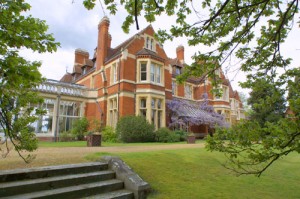For this entry I’m showcasing something that we’ll be visiting many times more. STOIC, the Student Television Of Imperial College was formed in 1969 and is still running today some 40 years later, in fact it’s their 40th Birthday this week. Because they were taking a student point-of-view on college life and were free to feature and record what they wanted, they have left us with a unique record of Imperial College that does not exist elsewhere.
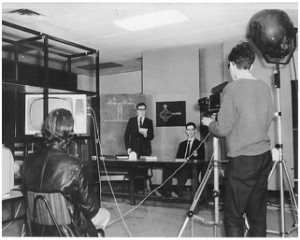
STOIC’s origins are with the Electrical Engineering Department (who owned and ran the original TV Studio) in January 1969, after being formed following a suggestion from Sinclair Goodlad. The initial idea was to help operate the cameras for the departments “20 minute talks” that ran each Wednesday afternoon (see photo from 1967). This would give them something positive to do and would also give them experience prior to the setting up of an official union club and by October 1969 this had happened. The first experimental news programme was recorded on 17 February 1970 and was called “IC Newsreel”. Now 40 years later, this programme still exists on videotape and an extract from that programme can be seen in the 10th anniversary recording at the end of this current blog entry. In it you’ll see Professor John Brown, then head of the electrical engineering department speaking about the death of Lord Jackson the Pro-Rector. John Brown being a relative of Prime Minister Gordon Brown.
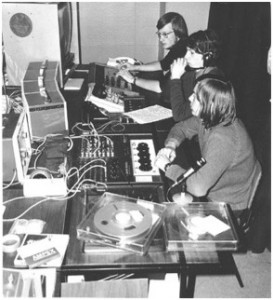
For the first and second programmes the technology limited the students to 1/ recording only within the confines of the studio and 2/ recording in one go, that is, without any form of editing. Because of this, showing things outside of the studio was clearly not possible, but there was a simple solution by using 8mm home movie film. STOIC shot short items on film and edited them into a suitable order for use in the programme. The films were silent and frequently in black and white, although some do exist in colour (the videod programmes were black and white). Although a small collection of those 8mm films are still around, the news programmes that they were shot for have long since been erased. This was due to the fact that videotapes cost around £30 at that time. So, all these years later we are still able to see short film clips of events and that’s what we’re going to do now.
This is a film clip from the early 1970’s and may well be featured in one of the first two programmes still on tape. But here it is in its original 8mm film version as used in the programme. It’s a student union meeting being run by the union president Piers Corbyn and we’re lucky that Lord Penney, the Rector, was clearly addressing and answering questions from students. This 8mm cine film is interesting because, besides the videotape interview, this is the only other moving film record of Lord Penney at Imperial College. Remember this is silent and in black and white.
STOIC were well underway by the time of this next video from June 1971. It focuses on the fact that they were heavily involved with the camera operation for the student’s 20 minute talks in Electrical Engineering. A mock-up talk is given by a STOIC member, who was also in the department as a student. The video was made to get members to join in the October of that same year. It should be remembered that at this time almost no one would have had access to video cameras, let alone a videotape machine, so being in STOIC gave people that access. Some of the technology behind the scenes is shown to enthuse students to join. It’s all very basic and looks a bit faked, you’ll see some flashes between sections where the videotape machine was stopped and then restarted to allow sections to be recorded (no editing as such at that time). Tim Dye, the chairman, appears at the end of the video to encourage people to join. This was made nearly 40 years ago so quality is poor, but it’s amazing that it has survived to this day!
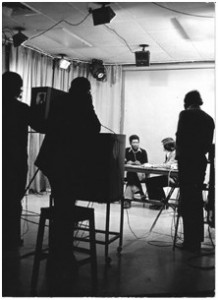
This next photo is interesting as it features the former Student’s Union President (1975-1977) Trevor Phillips being interviewed by Desmond King. This would have been for one of the weekly news programmes. Trevor went on to work (briefly) in TV himself with LWT, so perhaps these early outings were his first step towards that. Trevor will also feature in other videos in future posts on STOIC. He is (as of Feb 2010) chair of the Equality and Human Rights Commission. At this time, all main events were still studio bound, but things would soon change. 8mm cine film would soon be a thing of the past for their news programme coverage. Skipping forward some 8 years STOIC had bought their own portable videocamera recording system. This allowed them to go outside and record the type of events that students get involved with.
Morphy Day was one such event to be covered annually. Originally, on the day each year, just a cup was presented for rowing, but in later years on Morphy Day the towpath at Putney was also the scene for battles between supporters of the various teams. All sorts of waste food matter, flour and dead fish were hurled at each other. This was just too good an opportunity to miss and so we can now see Morphy Day from 1979, but we can’t smell it thank goodness. This event no longer happens and is therefore yet another unique record of college life and its traditions from years past.
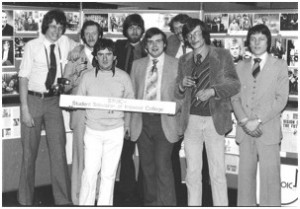
Finally, to end this first look at STOIC we have a video made to celebrate the first ten years of its operation. Because students will come and go in a natural cycle of time I was the only person who knew the history and the people involved since 1969. Although the formation became official in 1969, the first 10 years were actually celebrated in February 1980, this was to coincide with the first programme being made in February 1970. In conjunction with the current membership we made a video that celebrated all that had happened since the beginning.
Indeed a lot has happened during the time, going from black and white into colour was an obvious improvement and being able to edit was a major leap forward. A party was organised and every STOIC chairman to date attended (above photo). Jumping forward some 30 years perhaps an updated version is now long overdue? I hope those who remember watching STOIC’s programmes, or those who were members, enjoyed this first look back into their archives. So it’s another Happy Birthday to STOIC, 40 years old this very month!
Colin Grimshaw February 2010
